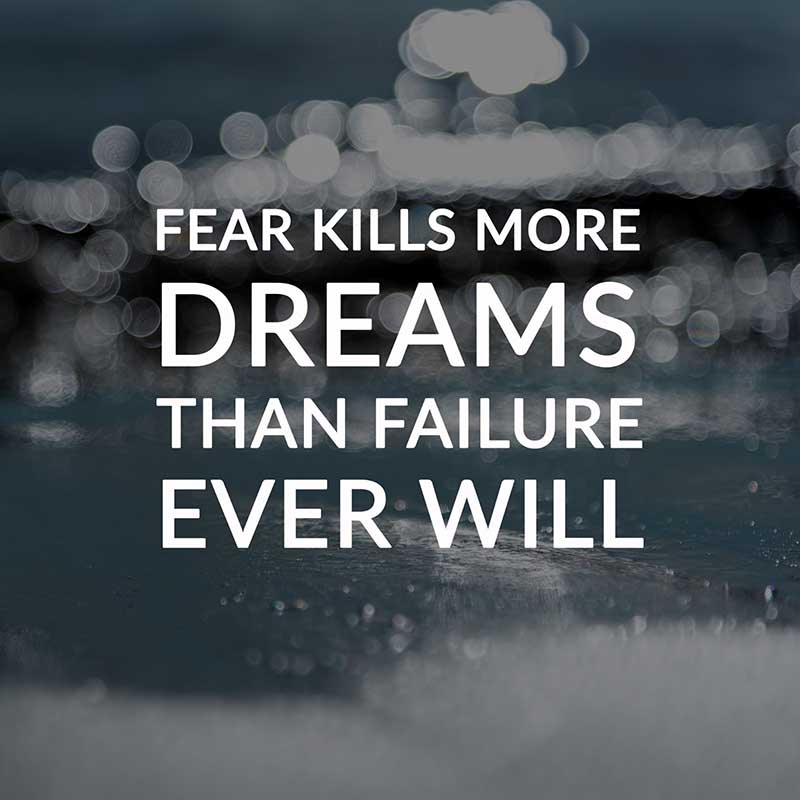One of the greatest obstacles we encounter in our quest to pursue our goals in life is the fear of failure. We worry about falling short of our expectations, of being found wanting, of not being good enough.

If we’re not careful, we can get into what therapists often refer to as “dichotomous thinking.” In other words, we come to see things in very black and white terms. For instance, I’m either a great success or a complete failure and nothing in between. This emphasis on outcome gives rise to a pernicious perfectionism which can stop us in our tracks. Perhaps you know the feeling?
Therapists are quick to pick up on these signs in their clients and frequently challenge what they see as “irrational” thinking. While it may well be “irrational” to believe that unless I achieve perfection in all that I set out to do, I’m a failure, this in itself doesn’t really get to the root of the problem. If so much of our thinking is self-defeating and irrational, why are we so predisposed to get caught up in it in the first place?
One obvious clue to this question can be found within the social world in which each and every one of us lives out our lives. In other words, the society in which we find ourselves reinforces this preoccupation with success since we see it reflected back at us via multi-various forms of media, and in particular social media in which we often go to great lengths to cultivate the illusion that our lives are, well, . . . perfect!

The perfect photo opportunity of a night out with friends, or carefully selected holiday snaps. The joy of our latest job promotion, or celebrating a marriage or our degree celebrations at university. The list is endless. The point is that most of us spend more time than we would care to admit on social media projecting a version of ourselves which is very one dimensional. This of course leads into the widely held fantasy that when we do something we ought to be successful, we ought to get it right!
One of the most frequent reasons for peoples inaction, which I hear time and time again during therapy sessions, comes down to a fear of making a mistake or getting something wrong. “How can I act unless I have all the facts and information necessary to convince me that I’m making the right decision.”
In other words, what we want, more than anything else, is the certainty that we are on the right track. Further, we believe that such certainty can be found if only we search hard enough for it. If we’ve done our due diligence, then we should know what to do and if we don’t or we get things wrong and fall flat on our face then this is because we must have overlooked something obvious.
When things don’t go to plan, when we find ourselves flailing around hopeless lost and at sea, we tell ourselves that it must be our fault, that we should have known better, if only we had focused more on this or that aspect of things. In other words, we take our failures deeply personally. This tendency to personalise things when they don’t work out feeds into a process of lowering our self- esteem. “I’m not good enough,” we say to ourselves. “Why do I always get it wrong?” This way of thinking presupposes the we should have known better. But is that really the case?
Soren Kierkegaard, the 18th century philosopher and writer, makes it clear that when it comes to the process of living, we can never have all the facts to hand which we believe we require in order to make important decisions and choices. The reason, he says, is because we humans are never the finished article but always exist in a state of incompleteness.
Kierkegaard puts it as follows:
“ It is quite true what philosophy says, that life must be understood backward. But then one forgets the other principle that it must be lived forward. This principle, the more one thinks it through, ends exactly with temporal life never being able to be properly understood because I can at no moment find complete rest to adopt the position: backward.”
From Kierkegaard’s Journals and Notebooks, Volume 2: Journals EE-KK

What Kierkegaard is saying is because life is a process, a dynamic unfolding rather than something static and complete, we can never see things clearly like we can with hindsight. Therefore, the challenge which each of us faces is to be able to act when things seem unclear and even uncertain and this requires courage. Why? Because we inevitably have to place ourselves outside our comfort zone which is precisely the known and certain realm which we so keenly want to cling to.
For Kierkegaard, our ability to act depends upon faith – in other words, the ability to act without the certainty and full knowledge which we would ideally like to have. It is only when we are able to understand that as human beings we exist in a perpetual state of incompleteness and that the certainties which we so desperately would like to have will frequently elude us that we are able to begin to take purposeful action.
And nobody knew this better than Soren Kiergegaard himself who learnt this lesson the hard way. As a young man, he was deeply in love with a woman called Regina Olsen and proposed to her in September 1840 only to quickly come to see once he had done so, that he had in fact made a mistake. This realisation set in almost immediately the couple had become engaged.
Kierkegaard came to realise that while he did indeed love Regina very much, he had serious doubts about whether he would be a suitable husband for her. This is because he came to understand that he could not tolerate the conventional life which he would have had to live in order to support her and any children which they might have had.
As a Christian, and given his background, the most likely employment for him would have been as a minister at a local church. A solid and well-respected job for sure but one which would have limited his opportunities to write and to feel free to express the reservations which he had about the orthodox Christian Church in Denmark where he lived.
Far better, he believed, was to live a less conventional life living on a small inheritance which he had received from his father, but being able to spend his days doing what he really wanted to do which was to write and most importantly, to be able to write openly and freely – something he felt he would only really be able to do were he not to feel worried that he might lose his job if he spoke out of turn.
And so began the extremely difficult process of calling off the engagement. Unfortunately for Kierkegaard, Regina was completely devastated by his rejection of her and initially refused to allow him to call off the engagement. This set in motion, a series of events in which Kierkegaard went out of his way to do everything he possibly could to convince her that she shouldn’t marry him including lying that he no longer loved her and communicating with her in increasingly cold and emotionally distant manner. On October the 11th, 1841, he did indeed call off the engagement citing his own dubious character and short comings as the primary reasons.
Why was Kierkegaard unable to realise any of this prior to asking for Regina’s hand in marriage? Perhaps he was negligent in some respect, or hadn’t thought this through sufficiently?
In fact, it was the act of asking her to marry him that ironically enabled him to realise that he didn’t in fact want to get married! Only by becoming engaged was he able to fully see the difficulties which this would bring for him. Being engaged changed things for him and brought to the fore, a whole set of implications which he was somehow unable to grasp sufficiently prior to the engagement.
So the mistake was inevitable really for precisely the reasons he states many years later in the above-mentioned quote. We can never have all the facts to hand and be sure we are making the right choice when the very choice itself changes dramatically the landscape of our lives and sometimes considerably so. The mistake then, is only really a point of view and this can shift depending on our vantage point. For Kierkegaard, things looked very different before and after becoming engaged.
Surely we can all relate to Kiergegaard’s experience. Haven’t we all made choices and decisions which we almost immediately came to regret? No doubt there will be memories which you yourself can recall in which you have wrestled long and hard about an important decision only to realise once you had made it that it was the wrong decision.
But rather than beat yourself up about this, perhaps it would be better to remember what Kierkegaard has to say about the impossibility of ever being in full command of all the necessary information in order to be certain of one’s decisions and give yourself a break.
Of course, you’re going to get things wrong, make all sorts of mistakes which with hindsight may well indeed seem crazy and obvious but without the luxury of hindsight to call on in real time, I’m afraid getting things wrong is a fact of life which none of us can escape. So what can we do about this? How can we get out of the self-defeating cycle of beating ourselves up and taking our mistakes so personally?
Perhaps the single most helpful thing we can do here is heed the words of Kierkegaard and acknowledge the limitations which each of us is confronted with when making important life choices and decisions. Yes, of course, be sure to think things through as thoroughly as you possibility can and give every decision the necessary time and attention which it deserves so you can be fairly confident you are on the right track.
But don’t beat yourself up when you discover the degree course which you were so sure would be right for you turns out to be a mistake or your new flat mate who you felt sure would be the ideal friend to live with turns out to be a nightmare. Instead, cut yourself some slack and ask yourself a few simple questions.
When confronted with an important decision, did it seem at the time like it was correct? Were you fairly sure you were making a good decision for yourself? If so, then this is as much as you can really hope for and fingers crossed things will work out for the best. But if not, then try to be accepting of your mistake and learn from it rather than taking it to be a sign of some sort of inadequacy on your part.

I’ve come to learn over the years working with clients that it’s far better to adopt a pragmatic attitude towards life than being overly preoccupied with having to always get everything right. Far better to act in an affirmative way with the courage of your convictions that you are doing the right thing than to worry endlessly about the possibility of failure. This approach only results in procrastination and sometimes we may back away from doing things altogether which deep down we know would be in our best interest just in case we are found wanting in some respect.
Does this sound like you? Can you think of occasions when the fear of getting something wrong or the spectre of failure has stopped you from acting at all? If so, hopefully, my post will help you to be a little more philosophically accepting of the possibility of failure so the you will be able to take purposeful action even if it turns out that you don’t get the results which you had originally hoped for.
Richard Swynnerton is a psychotherapist and counsellor working online and from his practice in High Barnet, Hertfordshire. If you would like to speak with Richard about having therapy sessions either online or in person, then give him a call or complete the contact form below.





Leave A Comment